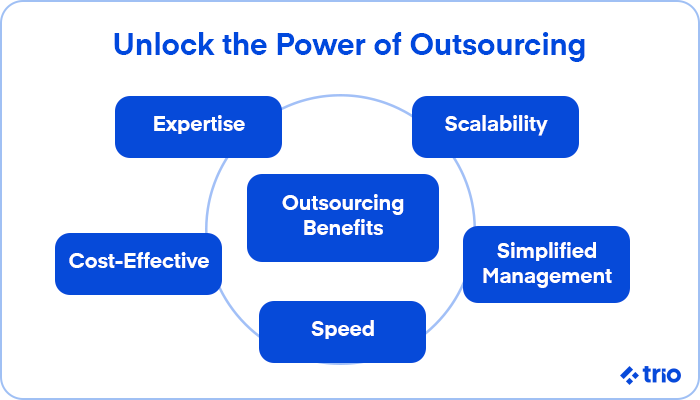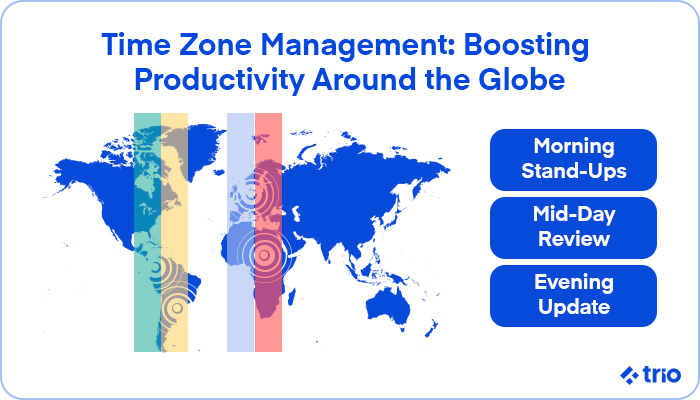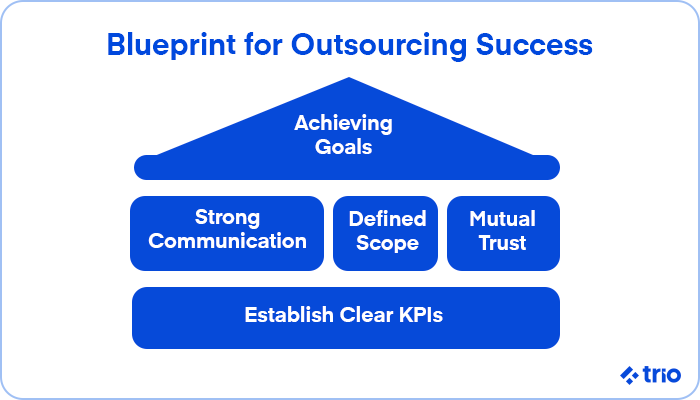In the competitive global business environment, outsourcing software development has become a vital strategy that you might just be able to take advantage of to optimize resources, access specialized expertise, and improve operational efficiency.
At Trio, we’ve seen how everyone, from small startups to global enterprises, outsourcing empowers companies to deliver quality products while maintaining flexibility and controlling costs.
But there are definitely some potential challenges. Outsourcing requires careful planning and execution to avoid pitfalls and achieve desired outcomes.
Let’s delve into the key considerations, benefits, challenges, and best practices for outsourcing software development and discuss whether outsourced developers are any good.
If you are interested in not only outsourcing but also building trust through software partnerships, we can help you. Not only do we utilize highly vetted developers with several years of experience, but we also support you in the long run.
Reach out to us if you would like more information on outsourcing your web app or mobile app development to set up a free consultation and see if Trio would be a good fit for collaborative software development.
Why Should You Consider Outsourcing Software Development?
What are the benefits of outsourcing software development?
The decision to outsource work related to software development instead of going with in-house development is not just about cost-saving, encompassing strategic and operational benefits that drive business growth.
These benefits include:
- Access to specialized expertise and skills
- Accelerated time-to-market
- Flexibility and scalability
- Cost-effective development
- No technical experience is required
Going through an outsourcing company provides access to professionals with deep knowledge and experience in specific domains that you might not have had with inhouse development.

They may also have access to the global talent pool, so you get the best of the best globally rather than the best developers available in your region.
This means your company may leverage the latest technological advancements and industry best practices, giving you a better end product.
For instance, fintech companies can partner with dev teams that specialize in blockchain development, while e-commerce platforms can collaborate with developers skilled in user experience (UX) optimization.
This level of specialization ensures higher-quality results than a generalist in-house team might deliver. It also ensures that product development includes the latest technologies, which general developers may not even have known about.
Beyond skill, speed is often very important to ensure the success of software projects.
Often, this is one of the main reasons why we recommend outsourcing to a company that has a good idea of what they want and no existing development team.
Outsourced teams focus exclusively on your development needs, streamlining processes and enabling faster delivery. This is especially beneficial in industries where being first to market can provide a significant competitive edge.
However, unlike when you hire a conventional team to develop quickly, when you outsource your work, you are able to scale development resources up or down based on project requirements.
Whether it’s adding developers during a peak workload or reducing the team size during maintenance phases, outsourcing offers flexibility that you just do not have when using any other hiring model, with a small exception for staff augmentation.
Outsourcing also reduces overhead development costs by eliminating the need for long-term employee commitments, office space, and equipment.
As if that were not enough, many outsourcing destinations also provide highly competitive rates without compromising on product quality. These rates are largely due to the low cost of living compared to that of an area in the U.S. like Silicon Valley.
The location of the developers does not affect the quality of work completed, so it is definitely something you should consider when looking for contractors or employees.
Finally, you don’t need to manage the outsourced firm or contracting company as closely as you would any other team. Since you don’t need to manage, you need no technical experience either.
This is why we recommend outsourcing software engineers as the best option for non-tech companies who have an idea but don’t know how to bring it to life themselves.
How does outsourcing impact productivity?
Outsourcing can significantly boost productivity when managed effectively, even when you have no knowledge of coding yourself.
When hiring an agency for the development of a software project, you will often notice that their external teams come with established workflows, tools, and processes.
This means that they can jump to work straight away in the most efficient way possible rather than figuring out what the best way to work would be through trial and error.
And, with developers in different time zones, work can continue around the clock. If this is managed effectively, your projects could be completed twice as quickly as they would be otherwise.
For example, while your in-house team reviews the day’s progress, your offshore team can be actively working on the next development phase, resulting in faster turnaround times.
In addition to time-zone benefits, outsourcing can alleviate the workload on your internal staff, allowing them to focus on core strategic tasks. This shuffling of resources tends to make your entire company more productive.
Why do successful companies outsource their development work?
At Trio, we have seen firsthand how outsourcing software development has been a pivotal factor in the growth of many renowned companies.
We’ve noticed that one of the biggest reasons is that it serves as a strategic tool to overcome resource constraints and focus on innovation.
There are numerous success stories of businesses – some of them very large companies – that leveraged outsourcing to achieve remarkable outcomes.
Slack, for instance, used a Canadian development firm to build its MVP (Minimum Viable Product), allowing the company to focus on branding and user acquisition.
Another great example to look at is how WhatsApp outsourced its development to Eastern European engineers during its early stages, significantly reducing costs while maintaining high-quality standards.
These examples highlight the strategic value of outsourcing for startups and established businesses alike.
It just shows how, if you are a startup or small business, outsourcing bridges the gap between limited resources and ambitious goals. This could potentially enable you to bring products to market quickly and efficiently.
But, even if you have a larger company, outsourcing can give you a fresh perspective and allow you to shuffle internal resources.
How to Choose the Right Outsourcing Partner?
What qualities should you look for in an outsourcing agency?
When choosing an outsourcing partner, you should focus on firms that demonstrate a strong track record in your industry. Look for case studies and portfolios that showcase their ability to handle projects similar to yours.
For example, we have a variety of success stories available on our website that you can easily access and follow up on.
You also need to look at the resources that the outsourcing firm has available to them so that you can build long-term tech partnerships even if you need to grow in the future.
While freelance developers or small companies might be suitable for smaller, short-term projects, larger and more complex initiatives often benefit from the resources and stability of an established outsourcing agency.
That said, for specific tasks or niche requirements, a skilled freelance developer can sometimes provide a cost-effective and flexible solution.
We would recommend that you evaluate whether the scope and demands of your project align better with an individual freelance professional, a niche company, or a dedicated team from an outsourcing firm.
But, regardless of what you decide on, technical expertise, communication skills, and reliability should always be top priorities during the selection process.
Your outsourcing partner should be proactive, responsive, and fluent in your preferred language. Cultural compatibility also plays a vital role in fostering a collaborative relationship, especially for long-term engagements.
Here at Trio, we always make sure that our developers are proficient in skills like effective client communication. We also focus on filling in any soft skills gaps we notice to ensure client and developer well-being.
How do we evaluate the expertise of outsourced developers?
Evaluating an outsourced team’s expertise requires thorough due diligence. Otherwise, you put your business at risk.
If you can, try reviewing their portfolios and the complexity of past projects they’ve handled.
Look for examples where their programmers successfully tackled challenges similar to those in your project.
We’ve already mentioned that you should request references and speak to their previous clients to understand their reliability and work quality.
To be safe, you also need to conduct technical assessments or interviews to gauge their proficiency in the required technologies. If you cannot do this yourself, you may want to use a third party or someone you trust.
Don’t overlook soft skills, such as problem-solving and adaptability, but you should be able to get a good idea of the management’s soft skills before you hire them.
What are the common mistakes to avoid when selecting an outsourcing firm?
Choosing the wrong outsourcing partner can lead to wasted resources and delayed timelines. There is always some level of risk, even if you make all of the right decisions. But here are some mistakes you should take note of.
The first thing we see very often is overlooking the importance of contractual agreements. This seems to be an issue that small companies and startups are more likely to fall for.
A poorly defined contract can result in misaligned expectations, scope creep, or disputes down the line. To avoid this, we recommend you ensure your contractual terms clearly outline the project scope, timelines, payment structure, and quality benchmarks.
Another mistake that we have noticed is quite prevalent is choosing a software outsourcing company or several freelancers based solely on cost. While affordability is important, it should not come at the expense of quality.
Another error is failing to establish clear project requirements upfront. Ambiguity in expectations often results in miscommunication and misaligned outcomes.
This is one of the biggest reasons why we make sure everyone is on the same page from the get-go and why we insist on creating an initial architecture before we proceed to full development.
Perhaps the least impactful mistake on this list is neglecting cultural and time-zone considerations. This can create operational challenges, impacting productivity and morale.
If you know that you will get quality work at the end of the day, having some cultural differences or issues with time zones isn’t as much of a problem when outsourcing as it might be when hiring an individual. But you still don’t want the added risk.
What Are the Key Challenges in Outsourcing Development?
How do you manage time zone differences with offshore teams?
As we’ve already mentioned, going with a software development company in another country may be the cheapest option. So, how can you handle issues that may come up?
Time zone differences can work to your advantage if managed well.

You need to start by establishing a few overlapping working hours to facilitate real-time discussions and follow-ups.
Scheduling regular meetings at mutually convenient times ensures alignment and keeps everyone on the same page.
You can also consider outsourcing to a country that has a cheaper cost of living but still has a relatively similar time zone to avoid this issue entirely.
When outsourcing, you probably won’t need to worry about collaborative development, so there should not be any other issues that result from offshore development.
What communication strategies can enhance collaboration with outsourced teams?
Effective communication is the foundation of successful software development, so it’s no surprise that it’s critical for outsourcing.
It is incredibly important that you start by setting expectations for frequency and channels of communication. Depending on where you find your outside developers, you may experience differences in work culture here.
We always recommend that our clients use centralized platforms such as Slack or Microsoft Teams to keep discussions organized. We use platforms like these here at Trio and have seen the benefits.
Video calls can be particularly effective for building rapport and resolving complex issues, and you can combine them with recording or transcription software to make sure you keep a record of everything.
Cultural sensitivity and an openness to feedback further strengthen collaboration and trust.
How do we ensure quality work from outsourced software developers?
As we have briefly discussed above, maintaining quality in outsourced development requires consistent oversight and clear processes.
One critical area to monitor is the codebase. A well-maintained codebase ensures that the software remains scalable, secure, and easy to update.
Coding standards must be implemented to achieve this, and regular code reviews must be enforced as part of the development workflow.
Unfortunately, this can be a little bit difficult if you have no technical experience yourself. So, you may have to work alongside the managing software engineers within the outsourcing firm to ensure they are checking and reviewing regularly.
You can also ask if they are using tools like GitHub, which can help provide transparency and version control for the codebase.
This could be beneficial if you decide to go with someone else to make future changes or decide you need to hire someone to keep on staff for long-term management.
It allows your development team to track changes, review contributions, and ensure consistency throughout the development process.
Another thing you may want to consider is periodic audits of the codebase. This can be done within the firm or by someone you trust.
Audits can help identify potential issues early and maintain the overall integrity of the software.
What is the Role of Project Management in Outsourced Development?
How can you effectively manage a development project with an offshore team?
Assuming you are working closely with the team, you should assign a dedicated project manager adept in agile methodologies, such as Scrum or Kanban.
If you are not technically adept, you need to make sure a knowledgeable manager is in place and perhaps gain access to their project management platforms so that you can keep a close eye on productivity.
We have also seen our clients benefit from iterative development and regular feedback. Daily stand-ups and sprint reviews keep teams aligned and focused on priorities.
If you are outsourcing, you don’t need to be part of all the feedback sessions, but it’s good to know they are happening and if any issues come up.
What tools can help in managing outsourced software projects?
We have already mentioned some tools and resources throughout the article, but let’s compile them all in one place, with a few additions, so that you can get a better idea of everything you’ll need when building software development teams.
First, project management tools like Jira and Trello streamline task tracking and team collaboration.
Zoom is a great option for video calls as it facilitates virtual meetings, while Slack enables quick and informal communication.
Version control tools like GitHub ensure transparency and maintain consistency in code quality, which are essential for any project.
Many of these are just one example of tools that might work. It is up to you to find an option that will fit your team.
How do you set clear software requirements for your outsourced team?

Establishing clear and detailed specifications is essential to the success of any outsourcing project. A well-documented project scope ensures that all stakeholders are aligned on expectations and minimizes the risk of misunderstandings. Begin by outlining the functionality, features, and performance benchmarks you expect from the software.
Incorporate visual aids such as diagrams, wireframes, and prototypes to complement the written specifications, making complex ideas easier to understand. Ensure that these specifications are reviewed and approved by all relevant parties, including internal teams and the outsourced developers. By providing this level of clarity upfront, you set a strong foundation for effective collaboration and successful project outcomes.
To ensure a successful outsourcing experience, involving a business analyst in the early stages of the project can be invaluable. A business analyst bridges the gap between your business objectives and the technical execution, helping to translate high-level goals into actionable software requirements. They work closely with stakeholders to gather, refine, and prioritize needs, ensuring that the outsourced team has a clear understanding of the project scope.
In addition to documenting functionality and features, a business analyst can create user stories, workflows, and use cases that provide deeper insights into the intended outcomes. This role also ensures that the software aligns with your business processes and delivers value to end users. By involving a business analyst, you can create a comprehensive and detailed project blueprint that minimizes misunderstandings and keeps development on track.
How to Ensure a Successful Outsourcing Experience?
What are the best practices for successful outsourcing?
A company’s reputation says a lot, but you should still be careful. Start with smaller projects to assess compatibility and build trust. Establish clear KPIs (Key Performance Indicators) to measure progress and success.
Regular feedback sessions help address issues promptly and maintain alignment with goals. Transparency, honesty, and mutual respect are key to fostering a productive partnership.
Here at Trio, we offer all of this in an effort to provide transparent project management.
How do you build a strong relationship with your outsourcing partner?
Strong relationships are built on trust and communication.
You should celebrate milestones together and recognize the contributions of the outsourced team. You should also be respectful of cultural differences, as these factors strengthen collaboration and morale.
This can be a bit difficult when you are overseas, but even celebrating with a positive video call can boost morale, adding to overall developer satisfaction and well-being.
What metrics can you use to measure the success of outsourced software development?
Key metrics that you need to look at will depend on your specific project, but they may include things like adherence to timelines, defect rates, and client satisfaction scores.
Regular performance reviews and surveys, which we have already mentioned, will also give you a better idea of any metrics you may be missing or tracking that are perhaps redundant.
What are the Trends in Software Development Outsourcing?
How is automation changing the landscape of outsourcing?
Automation tools powered by AI and ML are enhancing productivity and quality assurance.
Automated testing tools, for example, reduce manual workloads, allowing developers to focus on high-value tasks.
This increases the speed at which products can be produced without sacrificing quality and also adds to developer well-being by reducing stress and workload.
What are the emerging markets for offshore outsourcing?
Regions like Eastern Europe, Africa, and South America are gaining popularity due to their skilled talent pools and competitive pricing.
These markets offer diverse expertise across industries, making them ideal outsourcing destinations.
Additionally, many people find that the work ethic of developers from these regions is quite high but consistent.
With the right strategy and approach, outsourcing software development can be a transformative decision for your business, enabling innovation, scalability, and long-term growth.
If you are thinking of outsourcing or want to better your options for getting more developers on your project, reach out to us here at Trio.
With several years in the industry, we have the experience to advise your individual project rather than provide a cookie-cutter solution.







